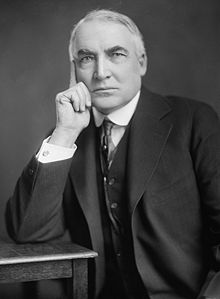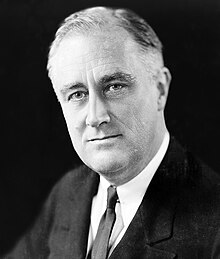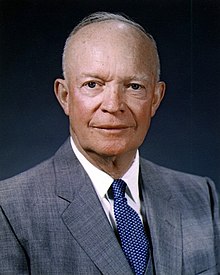Dear Readers,
On Friday, July 5, 2013, I received an E-mail from one Richard Miller, who is the proprietor of a very large conservative political blog titled Friends of Liberty. Upon reading my article on Ronald Reagan's record on the environment, he was apparently impressed enough to forward to me an invitation to serve as one of his contributing writers on his now-four year old blog; I have never had anyone outside of my closest circles of friends or family members show such interest or faith in my opinions before. Yesterday, after replying to him that I would do so only if it did not require that I neglect this blog, my own personal blog, that has been growing in page views and viewers rapidly since its formation on May 3, 2013, he said that it would not be a problem with him even if I choose to share articles between the two blogs. At this, I accepted, and after ironing out some details regarding passwords, etc., I wrote my first article, which you will read below, introducing myself and telling a little about my life and background; declaring my personal beliefs; and of course, I supported each and every opinion posited with a brief history lesson, as is characteristic of me to do on my blog.
Do not worry about me ever neglecting this blog. I told Mr. Miller that under no circumstances will I ever place his blog above mine in priority. Your (almost) daily article or two will continue to be written and published.
I will end this letter by expressing my sincerest gratitude to you, my audience, for reading what can sometimes verge on being tantamount to rants and ravings. I do, however, try to express my thoughts as clearly and concisely as I possibly can, through the tools history provides me as an individual with a degree in the discipline, and finally my firm belief that there is still a bright future ahead for America even at this point in time when so much about our present and the posterity ahead may look bleak.
Thank you, and may God bless you all.
Sincerely,
Jonathan Henderson; aka. "The Son of Liberty"
Jonathan Henderson; aka. "The Son of Liberty"
***
My Introduction to Friends of Liberty: "Thank You for Allowing Me to Serve as a Contributor of Not Just a Blog, But as an Instrument for Liberty"
"Government is not the solution to our problem. Government is the problem."
- President Ronald Reagan, 1981 Inaugural Address, January 20, 1981
Dear Fellow Patriots,
My name is Jonathan Henderson, and I am a lifelong resident of Knoxville, Tennessee, located in the extreme eastern corridor of the state, in one of the most conservative areas politically in the nation. I am a 2012 graduate of the University of Tennessee, holding a B.A. in History and a minor in Political Science. I plan to return to graduate school to earn my Masters in History or Library Sciences and possibly complete the final nine credit hours necessary to earn a degree in Political Science. My designs are on an occupation as a historical archivist or a museum curator, but I am seriously considering working a political campaign in 2014 for one of the GOP candidates for the state legislator or possibly Rep. John J. (Jimmy) Duncan, Jr., who is our long-time serving congressman in this district. I have also not dismissed the possibility of running for public office sometime in the future after I attain greater financial stability. My concerns about the direction, or lack thereof, down which our nation is venturing in light of the recent examples of corruption we see with the Obama administration as well as his socialist policies of perpetuating the welfare state that are resulting in the manifestation of class-warfare reignited my interest in politics at the end of 2012 after being largely disenchanted and skeptical about our government upon the failures of former President George W. Bush; and I have only grown more passionate about my desires to work towards ending the cultures of dependency, licentiousness without consequences, and irresponsibility and the lack of personal accountability we have seen out of the American people due to the efforts of the federal government, the mass media, and pop culture since the Clinton presidency. It is my hope that after achieving this, we together will be able to restore the principles of the Reagan Revolution imbued within the phrase,"Morning in America." The metaphor of the sunset on our nation has lasted long enough. It is time to act, and through my opinions posted on both this and my personal blogs, I am going to act accordingly.
I first want to thank Richard Miller for inviting me to serve as a contributor to this blog advocating the principles of "life, liberty, and the pursuit of happiness" Thomas Jefferson wrote in the Declaration of Independence during that hot Philadelphia summer of 1776. These three concepts were the first to be attributed to describing those upon which our great republic would be founded, and through the voices of people like you and me, we will continue to perpetuate the legacy of the Spirit of 1776.
In a letter written on June 18, 1813 to Jefferson, John Adams, another of the key Founding Fathers, discussed what he believed to be the three principles behind the foundation of the new republic of the United States:
In a letter written on June 18, 1813 to Jefferson, John Adams, another of the key Founding Fathers, discussed what he believed to be the three principles behind the foundation of the new republic of the United States:
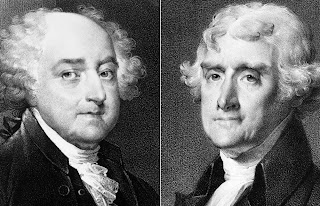
(Above: John Adams, Left; and Thomas Jefferson, Right; Founding Fathers and former presidents of the United States.)
"The general Principles of Christianity; and the general Principles of English and American liberty." How very profound was Adams in his wisdom! However, for the past 50 years, these principles have come under attack by the Left. I once read an article on the educational website maintained by a gentlemen named Steve Straub called The Federalist Papers about how Americans today identify more with the principles that guided the radical left-wing revolutionaries who prosecuted the French Revolution than those of their own. Adams, in another letter to Jefferson dated March 2, 1816, discussed what these were:
Quincy, 2 March, 1816.
I cannot be serious! I am about to write you the most frivolous letter you ever read. Would you go back to your cradle, and live over again your seventy years? I believe you would return me a New England answer, by asking me another question, “Would you live your eighty years over again?” If I am prepared to give you an explicit answer, the question involves so many considerations of metaphysics and physics, of theology and ethics, of philosophy and history, of experience and romance, of tragedy, comedy, and farce, that I would not give my opinion without writing a volume to justify it. I have lately lived over again in part, from 1753, when I was junior sophister at college, till 1769, when I was digging in the mines as a barrister at law for silver and gold in the town of Boston, and got as much of the shining dross for my labor, as my utmost avarice at that time craved. At the hazard of the little vision that is left me, I have read the history of that period of sixteen years, in the six first volumes of the Baron de Grimm. In a late letter to you, I expressed a wish to see a history of quarrels, and calamities of authors in France, like that of D’Israeli in England; I did not expect it so soon, but now I have it in a manner more masterly than I ever hoped to see it. It is not only a narrative of the incessant great wars between the ecclesiastics and the philosophers, but of the little skirmishes and squabbles of poets, musicians, sculptors, painters, architects, tragedians, comedians, opera singers, and dancers, chansons, vaudevilles, epigrams, madrigals, epitaphs, sonnets, &c.
No man is more sensible than I am of the service to science and letters, humanity, fraternity, and liberty, that would have been rendered by the encyclopedists and economists, by Voltaire, D’Alembert, Buffon, Diderot, Rousseau, La Lande, Frederic and Catherine, if they had possessed common sense. But they were all totally destitute of it. They seemed to think that all Christendom was convinced, as they were, that all religion was “visions judaiques,” and that their effulgent lights had illuminated all the world; they seemed to believe that whole nations and continents had been changed in their principles, opinions, habits, and feelings, by the sovereign grace of their almighty philosophy, almost as suddenly as Catholics and Calvinists believe in instantaneous conversion. They had not considered the force of early education on the minds of millions, who had never heard of their philosophy.
And what was their philosophy? Atheism,—pure, unadulterated atheism. Diderot, D’Alembert, Frederic, De La Lande, and Grimm, were indubitable atheists. The universe was master only, and eternal. Spirit was a word without a meaning. Liberty was a word without a meaning. There was no liberty in the universe; liberty was a word void of sense. Every thought, word, passion, sentiment, feeling, all motion and action was necessary. All beings and attributes were of eternal necessity; conscience, morality, were all nothing but fate. This was their creed, and this was to perfect human nature, and convert the earth into a paradise of pleasure.
Who and what is this fate? He must be a sensible fellow. He must be a master of science; he must be a master of spherical trigonometry, and great circle sailing; he must calculate eclipses in his head by intuition; he must be master of the science of infinitesimals, “la science des infiniment petits.” He must involve and extract all the roots by intuition, and be familiar with all possible or imaginable sections of the cone. He must be a master of the arts, mechanical and imitative; he must have more eloquence than Demosthenes, more wit than Swift or Voltaire, more humor than Butler or Trumbull; and what is more comfortable than all the rest, he must be good-natured; for this is upon the whole a good world. There is ten times as much pleasure as pain in it.
Why, then, should we abhor the word God, and fall in love with the word fate? We know there exists energy and intellect enough to produce such a world as this, which is a sublime and beautiful one, and a very benevolent one, notwithstanding all our snarling; and a happy one, if it is not made otherwise by our own fault.
Ask a mite in the centre of your mammoth cheese, what he thinks of the ‘το πᾶν.” I should prefer the philosophy of Timæus of Locris, before that of Grimm, Diderot, Frederic, and D’Alembert. I should even prefer the Shaster of Indostan, or the Chaldean, Egyptian, Indian, Greek, Christian, Mahometan, Teutonic, or Celtic theology. Timæus and Ocellus taught that three principles were eternal: God, matter, and form. God was good, and had ideas; matter was necessity, fate, dead, without form, without feeling, perverse, untractable, capable, however, of being cut into forms of spheres, circles, triangles, squares, cubes, cones, &c. The ideas of the good God labored upon matter to bring it into form; but matter was fate, necessity, dulness, obstinacy, and would not always conform to the ideas of the good God, who desired to make the best of all possible worlds, but matter, fate, necessity, resisted, and would not let him complete his idea. Hence all the evil and disorder, pain, misery, and imperfection of the universe.
We all curse Robespierre and Bonaparte; but were they not both such restless, vain, extravagant animals as Diderot and Voltaire? Voltaire was the greatest literary character and Bona the greatest military character of the eighteenth century; there is all the difference between them; both equally heroes and equally cowards.
When you asked my opinion of a university, it would have been easy to advise mathematics, experimental philosophy, natural history, chemistry, and astronomy, geography, and the fine arts, to the exclusion of ontology, metaphysics, and theology. But knowing the eager impatience of the human mind to search into eternity and infinity, the first cause and last end of all things, I thought best to leave it its liberty to inquire, till it is convinced, as I have been these fifty years, that there is but one being in the universe who comprehends it, and our last resource is resignation.
This Grimm must have been in Paris when you were there. Did you know him or hear of him?
I have this moment received two volumes more; but these are from 1777 to 1782, leaving the chain broken from 1769 to 1777. I hope hereafter to get the two intervening volumes.

(Above: Madeline Murray O'Hair, 1919-1995, who was an atheist activist. Courtesy of Wikipedia)
We, as a society run predominantly by the Left in political office, pop culture in the entertainment industry, and in the mass media, more wholly identify with the principles behind the French Revolution as opposed to those of ours, its American cousin. The principles of the French Revolution are based upon atheism, a phenomena that appears to have found its domestic origins in our society sometime around 50 or so years ago. We know that through challenges brought before the U.S. Supreme Court in 1962 and 1963, first with Engel v. Vitale that the High Court ruled to ban mandatory prayer in public schools, and later Abingdon School District v. Schemp, when the Justices struck down mandatory biblical recitations, this particular period was most likely the beginning of such atheist activists as the late Madeline Murray O'Hair who fundamentally altered the culture and the source of discipline for future generations of children in America. Unfortunately, this direction has resulted in the increase in immorality and violence in our society. While there are no articles or amendments in the Constitution nor the Bill of Rights specifically stating that the federal government and the American people will observe a separation of church and state -- though some scholars will state that the First Amendment guarantees this through its right to freedom of religion -- the concept was actually originated, too, by Jefferson, in his correspondence with the Danbury Baptist Association:
The following is Jefferson's response:The address of the Danbury Baptist Association in the State of Connecticut, assembled October 7, 1801.To Thomas Jefferson, Esq., President of the United States of AmericaSir,Among the many millions in America and Europe who rejoice in your election to office, we embrace the first opportunity which we have enjoyed in our collective capacity, since your inauguration , to express our great satisfaction in your appointment to the Chief Magistracy in the Unite States. And though the mode of expression may be less courtly and pompous than what many others clothe their addresses with, we beg you, sir, to believe, that none is more sincere.Our sentiments are uniformly on the side of religious liberty: that Religion is at all times and places a matter between God and individuals, that no man ought to suffer in name, person, or effects on account of his religious opinions, [and] that the legitimate power of civil government extends no further than to punish the man who works ill to his neighbor. But sir, our constitution of government is not specific. Our ancient charter, together with the laws made coincident therewith, were adapted as the basis of our government at the time of our revolution. And such has been our laws and usages, and such still are, [so] that Religion is considered as the first object of Legislation, and therefore what religious privileges we enjoy (as a minor part of the State) we enjoy as favors granted, and not as inalienable rights. And these favors we receive at the expense of such degrading acknowledgments, as are inconsistent with the rights of freemen. It is not to be wondered at therefore, if those who seek after power and gain, under the pretense of government and Religion, should reproach their fellow men, [or] should reproach their Chief Magistrate, as an enemy of religion, law, and good order, because he will not, dares not, assume the prerogative of Jehovah and make laws to govern the Kingdom of Christ.Sir, we are sensible that the President of the United States is not the National Legislator and also sensible that the national government cannot destroy the laws of each State, but our hopes are strong that the sentiment of our beloved President, which have had such genial effect already, like the radiant beams of the sun, will shine and prevail through all these States--and all the world--until hierarchy and tyranny be destroyed from the earth. Sir, when we reflect on your past services, and see a glow of philanthropy and goodwill shining forth in a course of more than thirty years, we have reason to believe that America's God has raised you up to fill the Chair of State out of that goodwill which he bears to the millions which you preside over. May God strengthen you for the arduous task which providence and the voice of the people have called you--to sustain and support you and your Administration against all the predetermined opposition of those who wish to rise to wealth and importance on the poverty and subjection of the people.And may the Lord preserve you safe from every evil and bring you at last to his Heavenly Kingdom through Jesus Christ our Glorious Mediator.Signed in behalf of the Association,Neh,h Dodge }Eph'm Robbins } The CommitteeStephen S. Nelson }
Messrs. Nehemiah Dodge, Ephraim Robbins, and Stephen s. NelsonA Committee of the Danbury Baptist Association, in the State of Connecticut.Washington, January 1, 1802
Gentlemen,--The affectionate sentiment of esteem and approbation which you are so good as to express towards me, on behalf of the Danbury Baptist Association, give me the highest satisfaction. My duties dictate a faithful and zealous pursuit of the interests of my constituents, and in proportion as they are persuaded of my fidelity to those duties, the discharge of them becomes more and more pleasing.Believing with you that religion is a matter which lies solely between man and his God, that he owes account to none other for his faith or his worship, that the legislative powers of government reach actions only, and not opinions, I contemplate with sovereign reverence that act of the whole American people which declared that their legislature would "make no law respecting an establishment of religion, or prohibiting the free exercise thereof," thus building a wall of separation between Church and State. Adhering to this expression of the supreme will of the nation in behalf of the rights of conscience, I shall see with sincere satisfaction the progress of those sentiments which tend to restore to man all his natural rights, convinced he has no natural right in opposition to his social duties.I reciprocate your kind prayers for the protection and blessing of the common Father and Creator of man, and tender you for yourselves and your religious association, assurances of my high respect and esteem.Th JeffersonJan. 1. 1802(Above: A copy of Jefferson's letter to the Danbury Baptist Association from January 1, 1802. Courtesy of The Library of Congress)

(Above: Painting of the Storming of the Bastille; July 14, 1789. Courtesy of Wikipedia)
The principle of atheism that was the source of authority for the Committee of Public Safety and Directory during the French Revolution resulted in between 16,000 and 40,000 deaths via the guillotine during the Reign of Terror from 1793 to 1794. The article on Wikipedia analyzed the French Revolution's legacy, and determined it to be the following:
The French Revolution has received enormous amounts of historical attention, both from the general public and from scholars and academics. The views of historians, in particular, have been characterized as falling along ideological lines, with disagreement over the significance and the major developments of the Revolution.[148] Alexis de Tocqueville argued that the Revolution was a manifestation of a more prosperous middle class becoming conscious of its social importance.[149]
Other thinkers, like the conservative Edmund Burke, maintained that the Revolution was the product of a few conspiratorial individuals who brainwashed the masses into subverting the old order—a claim rooted in the belief that the revolutionaries had no legitimate complaints.[150] Other historians, influenced by Marxist thinking, have emphasized the importance of the peasants and the urban workers in presenting the Revolution as a gigantic class struggle.[151] In general, scholarship on the French Revolution initially studied the political ideas and developments of the era, but it has gradually shifted towards social history that analyzes the impact of the Revolution on individual lives.[152]
Historians widely regard the Revolution as one of the most important events in human history, and the end of the early modern period, which started around 1500, is traditionally attributed to the onset of the French Revolution in 1789.[153] The Revolution is, in fact, often seen as marking the "dawn of the modern era".[154] Within France itself, the Revolution permanently crippled the power of the aristocracy and drained the wealth of the Church, although the two institutions survived despite the damage they sustained. After the collapse of the First Empire in 1815, the French public lost the rights and privileges earned since the Revolution, but they remembered the participatory politics that characterized the period, with one historian commenting: "Thousands of men and even many women gained firsthand experience in the political arena: they talked, read, and listened in new ways; they voted; they joined new organizations; and they marched for their political goals. Revolution became a tradition, and republicanism an enduring option."[155]
Some historians argue that the French people underwent a fundamental transformation in self-identity, evidenced by the elimination of privileges and their replacement by rights as well as the growing decline in social deference that highlighted the principle of equality throughout the Revolution.[156] The Revolution represented the most significant and dramatic challenge to political absolutism up to that point in history and spread democratic ideals throughout Europe and ultimately the world.[157] However, according to French historian François Furet it was also the origin of totalitarian political ideas, and of the legitimization of systematic, large-scale violence against social classes considered undesirable.[158] Thus, it had a profound impact on the Russian Revolution and its ideas inspired Mao Zedong in his efforts at constructing a communist state in China.[159]

(Above: Early depiction of the tricolor in the hands of a sans-culotte during the French Revolution. Courtesy of Wikipedia)
Not coincidentally, the ultimate legacy begat by the French Revolution -- totalitarianism -- ultimately filled the majority of the pages of 20th Century history books. Like the French Revolution, the communist states of the Soviet Union and the People's Republic of China who followed the principles of the French interior conflict resulted in estimates of as many as 130 million deaths combined under dictators Joseph Stalin and Mao Zedong. Those nations, the two most notorious for mass murders by genocide or through designed famine to control population growth, were founded upon the principle of atheism as was revolutionary France. That, unfortunately, appears to be the avenue down which America is traveling today, as our society meanders down the incendiary path towards its own perdition.


(Above: Soviet dictator Joseph Stalin, Left; People's Republic of China founder/dictator Mao Zedong, right. Courtesy of Wikipedia)
When I reflect upon my grade school history classes from the 5th Grade onto my AP U.S. History course my junior year of high school in which I received an "A" in the class and a "5" on the AP exam, I recall very distinctly learning that Anglo-America, as it was founded by English men and women, was conceived upon the principles of what we know to be the "Three G's": God, gold, and glory. Let there be no doubt, then, that the most important of those three principles is "God," for it is He who bequeathed to the people over the centuries the legitimacy to endeavor in the world's first modern experiment of self-government through the democratic process, and who manufactured the sacred fire of liberty for us to maintain and to preserve for all time. Deists believe that there is a God who created the universe and essentially left it alone to take shape as it will. While I am a Christian, I do believe that some of that concept is at least in part true when I state that though He created the conditions in which we, the people, find ourselves residing, it is up to us to maintain this holy legitimacy in order to preserve a well-ordered republic through the rule of law. Let there be no doubt, either, that the Constitution was heavily influenced by the Ten Commandments too in terms of the spirit of its laws.
As we know all too well now, our liberties are under attack today by the Left more than ever before. Sadly, our elected conservative senators and representatives who ran during the elections upon platforms favoring less government and greater liberty have done little more than mitigate these gross series of abuses. In my home state of Tennessee alone, Sens. Lamar Alexander and Bob Corker, both members of the GOP, have failed to stand up to the Democrats in the Senate adequately enough to preserve our liberties or to protect our jobs. Months ago when the gun control legislation was on the table, both Sens. Alexander and Corker voted to override other GOP members' attempts at a filibuster to halt the progression of the legislation, as Sens. Rand Paul and Ted Cruz were among those select few Republican senators leading the charge. Just last month, when the Senate voted overwhelming to pass the immigration bill, both Alexander and Corker were among those 14 Republicans who voted for it, and now it is up to the Republican-controlled House of Representatives to defeat the bill. Unfortunately, I wish I could say that I am optimistic they will do the right thing.
Through the power of the pen for which the Internet and the blogosphere serve as the modern metaphors, we can raise awareness of these abuses against humanity. Not since the 1960's has America been more divided socially and politically than it is today. Our leaders since the presidency of Ronald Reagan have lacked the philosophical and moral absolutism "The Gipper" possessed; furthermore, none have ruled with any conviction nor real consent from the governed. I wish I could say that the Republican presidents, congressmen, and senators have represented the interests of their constituents effectively, but I cannot. Perhaps it is time for a changing of the guard. I will never vote for a Democrat so long as I have a breath to emit from my body, but I find myself these days voting for GOP candidates not because they reflect the same principles and values I have in how I view the manner in which government should be operated, but because they are, as a party, the lesser of two evils. This should not be something we have to endure as voters in a free society. I have had several people who replied to recent articles on my personal blog, stating that the current two party system is a complete and utter failure. Others, though, are more concerned with the direction, or lack thereof, of the GOP, and say that the party is more focused on destroying the efforts of the conservative grassroots campaigns than it is in waging war on the Democrats. Yet another reply, perhaps the most profound of all in the opinion, was that if the GOP fails to find an identity, "it will go the way of the Whigs." Sadly, all of these assertions are ones upon which I concur. The party has become divided between factions led by John McCain and Lindsey Graham; and those by Rand Paul, Ted Cruz, and Mike Lee. How can we therefore, as conservatives with libertarian leanings, expect to have the agenda we wish to be implemented for the good of the nation by our elected GOP leaders enacted, if they continue to fight among themselves?
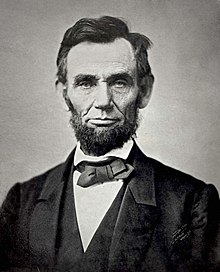
(Above: Abraham Lincoln, who served as the 16th president of the United States from 1861-1865 during the Civil War.Courtesy of Wikipedia)
Abraham Lincoln stated in 1858 in what was one of his most famous speeches that, "A house divided against itself cannot stand." We know today that he meant that the issue of slavery had so divided the nation between North and South that it eventually experienced a schism upon South Carolina becoming the first Southern state to secede from the Union on December 20, 1860, after Lincoln won the presidential election. Lincoln was the savior of the nation in his policies to both end "the peculiar institution" of slavery and restore the Union at all costs, but it would come at the ultimate price of his life. Likewise, the period between 1955 and 1969 saw the greatest period of civil unrest and social revolution since the first 65 years of the 19th Century when the Civil Rights Movement, the sexual revolution among feminists and homosexuals, the counterculture phenomena, and of course the New Atheists, rallied against the age-old establishment and forever fundamentally altered the course of our society and that of American history, some for the better, while others were for naught. We live in a nation more divided today politically than it has been since those years, with there being no end to the growing hostilities between Left and Right nor those within the GOP in sight. We must act quickly to vote into office those whom we believe would best serve our interests, who would reestablish the legitimacy and sanctity of the Constitution and the Bill of Rights, and finally, who will restore the Spirit of 1776 within the American people.
As Ronald Reagan stated in his famous stump speech for Sen. Barry Goldwater, the GOP nominee for president in 1964 who would sadly lose in a landslide to incumbent Lyndon B. Johnson, "You and I have a rendezvous with destiny." Would it not be great if we could return to America the Reagan Revolution's spirit, the one most akin to that of the Spirit of 1776 during modern times, and restore "Morning in America" for all time?
I know I do.
In closing this article introducing myself, I have posted a video featuring Ronald Reagan at the age of 53. This was his baptism and introduction to the public as a political activist rather than a simple actor, and would ultimately lead to his career in politics. The speech, famously titled "A Time for Choosing," was mentioned above in small detail. His rhetoric during the speech served as the founding principles upon which the formation of the new conservative movement he would usher into the public consciousness upon his election to the presidency in 1980 would be implemented in his policies. I hope you enjoy the video, and pay very close attention to Reagan as he shares his candid philosophical views of the wrong direction down which America was venturing during the 1960's:



